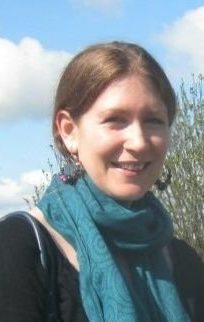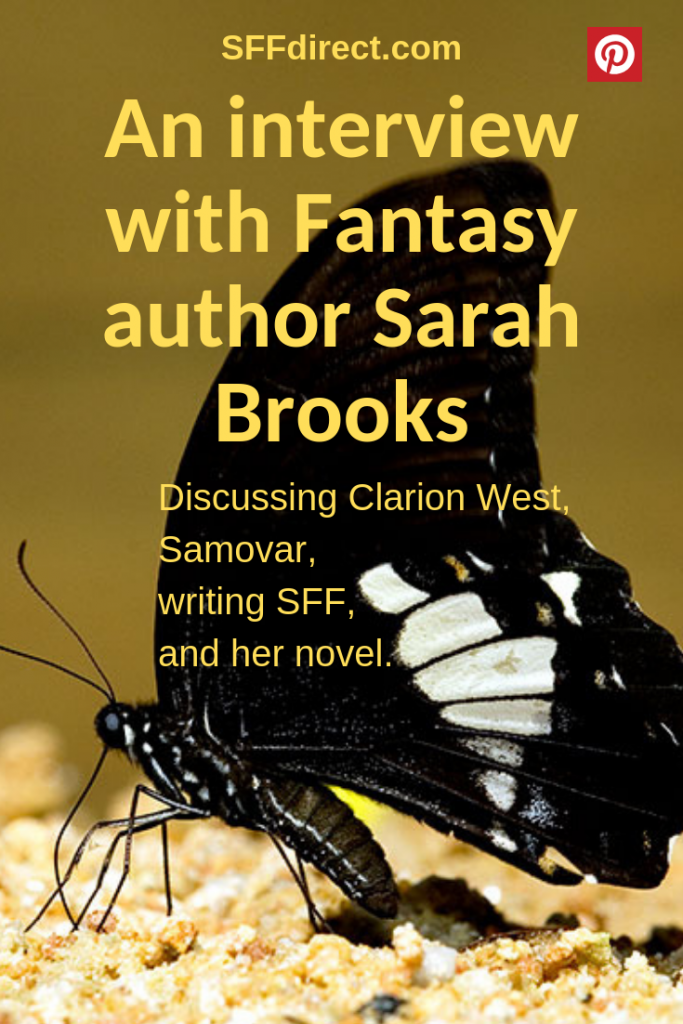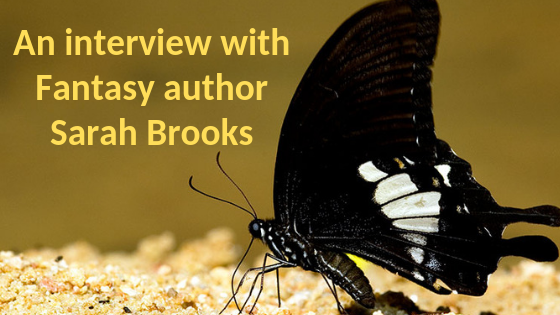I met Sarah Brooks in Leeds centre on 10th July 2019. She talked openly and candidly about her life in writing and was very generous with her time.

Sarah works in East Asian Studies at the University of Leeds. Her PhD was in 17th Century Chinese ghost stories. I’ve actually known her for a number of years because we are both members of Leeds Writers’ Circle, a Leeds-based writing group.
However, it’s only recently that I’ve realised how accomplished she is in Science fiction and Fantasy because she is so self-effacing. Hence hers isn’t a well-known name in the SFF world. However, it hopefully soon will be when her novel, The Cautious Traveller’s Guide to the Wastelands, is published.
Achievements
Sarah’s list of SFF credentials is long and varied and she’s had several prestigious competition wins. Here are some of her most significant accomplishments:
- A graduate of Clarion West Writers’ Workshop 2012.
- Stories published in top SFF magazines including Interzone, Strange Horizons and Shimmer. Her most recent publication was the short story Everything Rising, Everything Starting Again in Interzone’s March/April 2019 issue.
- Co-founder/editor of Samovar, which is Strange Horizons’ sister online publication of translated speculative fiction.
- Winner of the 2019 Lucy Cavendish College Fiction Prize at Cambridge University, with her novel The Cautious Traveller’s Guide to the Wastelands. This is a competition open to unpublished female authors, aged 21 and over. Entrants submit the first 40-50 pages of their novel and a synopsis, in any genre. The competition is unusual in that the novel does not need to be finished and it is known for the high standard of its writers. Following from the competition, Sarah was taken on by the literary agent who was one of the judges.
During the interview, Sarah discussed all the above. In the article that follows, I have paraphrased Sarah’s answers. It is informative reading for fans of SFF, but most of all for writers of SFF. In particular for those considering attending Clarion West or similar long-stay workshop.
What are you working on currently?
I’m working on my novel, The Cautious Traveller’s Guide to the Wastelands. I’m trying to keep going with short stories though, because I love both equally.
Tell us about The Cautious Traveller’s Guide to the Wastelands
This actually started as a story I wrote at Clarion West during George R R Martin’s week as the tutor. It is inspired by my time on the Trans-Siberian railway, which I travelled on from Beijing through Mongolia to Moscow. I have a first draft but I’m making revisions so nothing’s set in stone yet. It’s set around the 1860s in an alternate timeline where the landscape of Siberia has turned against humans and is unfit for human habitation. To get safely across, the only way is on the Trans-Siberian express.
The story is about a young girl who discovers a stowaway. The adventure begins when she realises that the stowaway isn’t entirely human and perhaps poses a danger to the train.
Is The Cautious Traveller’s Guide to the Wastelands your first novel?
No. My first novel was a project I wrote for NaNoWriMo. NaNoWriMo takes place every November, during which people attempt to write a 50,000 word novel. I think it is great to get people writing and show them they really can write 50,000 words. I loved the experience but the novel was of course very rough! So I put it away and began working on The Cautious Traveller’s Guide to the Wastelands.
What is your writing process?
Because I work full time, my writing generally takes place on evenings and weekends. I don’t write every day and I don’t have a routine. I write when I can find the time, and in term-time writing often takes a back seat. However, winning the Lucy Cavendish Prize gave me permission to take writing more seriously and really go for it, especially now I have an agent.
Describe your style
My style is stories set in the real world but with an added strangeness. I’d call it fantasy rather than science fiction. Idea-wise, I often start with setting. Character and plot come later.
Have you always written?
Yes, although I’ve never been good at finishing things! One piece of advice I’d give to new writers is to finish things. You learn most from finishing and editing work and you need to send it out.
Any other advice for beginner writers?
Keep sending work out. Don’t be put off. Take being a writer seriously. Read widely, both in your genre and outside it, including literary fiction. If you write short stories you should read them too. Read the magazines you’re submitting to, to understand the kind of work they accept. Also find a writing community. However you do it, whether it’s online or a writing group that meets face to face, just do it. Also, enter competitions; they’re good for motivation because there’s a deadline. (But I don’t always follow my own advice!)
I also recommend that writers read translated fiction. It gives insight into different lives.
Can you write anywhere or do you need certain conditions?
I can write anywhere but I like a little bit of noise so coffee shops are good. I like to write in different places.
What do you read?
I read widely. A lot of fantasy and science fiction, and a lot of translated fiction for work. But I also read romance and a lot of crime. I also read literary fiction.
What writers do you admire?
I really like Kelly Link’s short stories. Also Neil Gaiman and Frances Hardinge.
In terms of books on writing, I love Jeff VanderMeer’s Wonderbook. I also recommend Stephen King’s On Writing. It’s a classic and often-quoted but it’s still one of the best books on writing craft out there.
What was Clarion West Writers Workshop like?
Clarion West is a workshop for emerging SFF writers, providing world-class tuition. It takes place over a six week summer period at Seattle University. There are eighteen of you and you all stay in a big sorority house and take meals together.
You write a short story every week and there is a new tutor every week. Mornings are spent critiquing each other’s work; you do 3-4 people each day, Monday to Friday. They use the Milford method. This is where each person gets 2 minutes (or whatever time is agreed) to say their feedback. The writer being critiqued doesn’t speak during the feedback. They can respond when all the feedback is given. I found the feedback to always be supportive and constructive.
Afternoons are spent writing and reading everyone else’s stories because you get these in advance to read. In the evenings the tutor eats with you and you talk. There is a mystery guest during the week. Everything is friendly and informal. Every week, the tutor does a reading at the university bookshop. There’s a party every Friday! These are attended by graduates from previous years and also people from the SFF scene in Seattle. You meet lots of people.
The whole experience was incredible and I thoroughly recommend it. It is intense but completely worth it. It was life-changing. If anyone is considering applying I would say go for it. If money is a problem, be aware that there are lots of scholarships available so definitely apply for these too.
What did you learn from the Clarion West experience?
I learnt practical things like writing to a deadline. Realising you can write a story every week. Taking it more seriously and learning about the SFF community. I realised what a huge number of fans, conventions and magazines there are. Writerly things I learnt included how to avoid info-dumping. And about voice, point of view etc. I became more adventurous in my writing, and more confident at trying new things. They encouraged you to finish stories and send them out. After Clarion I did this much more.
I am still in touch with the other students. In fact, the people I founded Samovar with are fellow Clarion West students.
At what stage in their writer career do you recommend a writer apply to Clarion?
I think I attended at the right time. I’d been writing a while and wanted to take it more seriously but I wasn’t sure how. However, there were people there at all stages in their careers from the author with many published stories to the beginner.
Tell us about Samovar
Samovar is an online zine of translated speculative fiction and it is the sister publication of Strange Horizons. It came about because three of us from Clarion West had discussed overseas SFF and realised we knew little about what was going on in other countries. We wanted to start a magazine that paid both writers and translators. For a long time we didn’t know how to do it but another Clarion classmate put us in touch with Strange Horizons. They’d been thinking the same as us: that they wanted to start a magazine of translated speculative fiction. So in Strange Horizon’s 2016 Kickstarter campaign, they asked for money for the new publication and luckily got it.
All three founders are still editors and we all read every submission. I read up to a hundred submitted stories every quarter. It’s time-consuming but worth it. Samovar publishes two stories and a poem every quarter. We publish the original language version and the English translated version. I think it’s important to print both.
How does your work at the University of Leeds overlap with writing and speculative fiction?
I help manage the Transcultural Fantastic project at the University of Leeds, which examines translated speculative fiction. We invite Guest Speakers to give talks. My research is currently on Chinese science fiction and fantasy and I’m particularly interested in how Chinese SFF is exploring environmental issues. On the weekend of 11th October, Chen Qiufan (author of the Waste Tide, translated by Ken Liu) is coming to Leeds to speak at a symposium on genre fiction. Anyone who is interested is very welcome to attend. Please see our website for updates- https://writingchinese.leeds.ac.uk/.
What was your inspiration for Everything Rising, Everything Starting Again (in Interzone Mar/Apr 19)?
I was in Hong Kong about five years ago and I remember there being huge black butterflies. I thought what if they were souls? After that I started the story fairly quickly but I couldn’t get my head round it. When I attended Fantasycon in Scarborough in 2016 I came back to it and decided to set it at the sea. I often find that stories spark into life after one idea rubs against another idea.
Are you a planner or a pantser?
I usually have a bit of a plan. I’ll know key things and scenes. But that is all really, so I guess I’m a combination of both. I don’t start at the beginning and write to the end. Rather, I write snippets and then fit them together. This is true even for short stories. My first draft and my finished draft look very different. I often put stories away and come back to them so it can take some time to get the final version.
Do you always get work critiqued before you send it out, and how?
I try to but there have been occasions where I haven’t done so. When I do seek critiques, I’ve had them from my Clarion classmates or Leeds Writers’ Circle. Leeds Writers’ Circle is a Leeds-based writing group and they are a very supportive community of committed writers. I’ve benefitted hugely from their insights. I was the Committee’s Chairwoman for two years.
Recently, I’ve also been a member of the Northern Short Story Festival Academy (NSSFA), which is associated with the Northern Short Story Festival in Leeds, and the Big Bookend (Leeds’ annual literary event). The NSSFA is a group of 6 writers critiquing each other’s work under the mentorship of Anna Chilvers. Even though our formal group has finished we still meet to critique.
Do you do much self-promotion and marketing?
No, I’m not good at self-promotion but I’m hoping to make a website and perhaps more of a twitter presence. I run twitter accounts for work though, so doing my own twitter feels like more work and more time sacrificed to social media. For the same reason, I’m reluctant to be on panels at conventions: I go to conferences for work where I have to speak, so being on a panel at an SFF convention would feel like work. When I attend SFF conventions I like to just relax and listen to panels.
What trends do you see in science fiction and fantasy currently?
I think there is currently a lot of eco-fiction and climate change fiction. There is a great deal of interest in it, both academic and general. Associated with this is the rise of eco-gothic fiction, which is typified by dark themes, the landscape turning against us. As such, my own novel, The Cautious Traveller’s Guide to the Wastelands could be categorised as eco-gothic.
SFFdirect would like to thank Sarah Brooks for the interview, and wishes her every success with her forthcoming novel. Please let us know your thoughts below in the comments!



This was a really interesting interview Caroline and Sarah. I was particularly interested in the Clarion West venue. Sounds wonderful. I don’t really write Sci fi or Fantasy but I have been to Seattle once and loved the city. I think it must be an amazing place for a writing course and bound to be inspiring.
I only know Sarah through Leeds Writers’ Circle but her work is always beautifully written, well imagined and thought provoking. I can’t wait to read the finished novel. Sarah’s success is well deserved.
Hi Linda Thank you so much for your comment. Clarion West is the sister workshop of Clarion SFF workshop (http://clarion.ucsd.edu/) at the University of California, San Diego. Also a 6-week summer program. To all SFF writers – they’re both great; do apply!